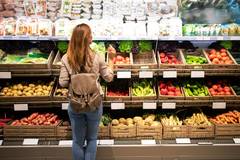Sustainable solutions: How major F&B players are tackling climate, cost and consumer trust challenges
Around one-third of all food produced each year is lost or wasted, according to the FAO, and conventional production continues to deplete water and other natural resources. The demand for innovative, sustainable solutions in the F&B industry has never been more urgent.
Manufacturers are turning to responsible sourcing, climate transition plans, renewable heat, and water-saving dry processes to meet sustainability targets as climate change strains crop yields and disrupts production.
This is reflected in Innova Market Insights data, which shows that F&B launches featuring sustainable and ethical claims increased by 5% between July 2020 and June 2025.
Food Ingredients First speaks with Ingredion, GNT, Corbion, and Beneo about their sustainability priorities and how they overcome hurdles in achieving resource-efficiency targets.
Andrew Utterback, director, Global Sustainable Sourcing at Ingredion, says that globally, up to 40% of food is lost or wasted according to the Upcycled Food Association, presenting a major sustainability challenge.
“Consumers are increasingly prioritizing purpose-driven brands that bring sustainability, transparency, and traceability to the table. They want to know where ingredients come from, how they’re grown, and their impact on the planet,” he explains.

“Ingredion’s proprietary ATLAS research shows that 68% of global consumers believe it is important that their packaged food and beverages are made from sustainably sourced ingredients, and 53% of USCAN and European consumers are willing to pay more for F&B products with upcycled certified claims.”
Innova Market Insights 2025 Trend Survey indicates that 35.3% of consumers globally agree they would pay more for brands/products that are actively solving sustainability issues, with 12.8% agreeing “strongly” to do the same.
Beyond greenwashing
Rutger de Kort, sustainability manager at GNT, says sustainability is “hugely important” to consumers, but considers the “greenwashing” trend leading to skepticism.
 Consumers value sustainability but demand clear, evidence-backed claims to cut through greenwashing, says De Kort.“To counter that, it’s important to back up claims with clear evidence and to communicate that clearly. We expect Product Carbon Footprints to be used much more going forward because it’s credible and measurable data.”
Consumers value sustainability but demand clear, evidence-backed claims to cut through greenwashing, says De Kort.“To counter that, it’s important to back up claims with clear evidence and to communicate that clearly. We expect Product Carbon Footprints to be used much more going forward because it’s credible and measurable data.”
Julie Van Gansewinkel, corporate sustainability manager at Beneo, says that despite sustainability becoming an increasingly crucial factor for consumers, they still prioritize “health over ethics” when purchasing food and drink products.
“Half of consumers think it is most important that ingredients are healthy and 41% that they are natural, while only one in four considers it a priority that they are sustainable.”
To address these focus areas, manufacturers need quality ingredients to meet health and sustainability demands, gaining an advantage by combining human and planetary benefits.
Sustainability priorities
Beneo is channeling its sustainability strategy, the ‘Healthy Planet Plan,’ toward four priority areas: fostering health, nutrition, and well-being, supporting resilient farming and supply chains, caring for Beneo’s workforce, and mitigating its operational impact on the planet, says Van Gansewinkel.
De Kort notes that GNT’s top priority is decarbonizing its operations and supply chain. “Lowering greenhouse gas (GHG) emissions helps us and our customers to minimize our impact on climate change, as well as making products more consumer-friendly.”
 Ingredion focuses on sustainable sourcing, regenerative agriculture, and AI-driven upcycling to cut waste and boost efficiency, says Utterback.Meanwhile, for Ingredion, 100% sustainable sourcing, expanding regenerative agriculture, and valorizing co-products to reduce waste are taking precedence over its environmental targets, says Utterback.
Ingredion focuses on sustainable sourcing, regenerative agriculture, and AI-driven upcycling to cut waste and boost efficiency, says Utterback.Meanwhile, for Ingredion, 100% sustainable sourcing, expanding regenerative agriculture, and valorizing co-products to reduce waste are taking precedence over its environmental targets, says Utterback.
“We’re also leveraging AI and technology to optimize upcycling processes and enhance manufacturing efficiency across the value chain.”
Corbion’s focus is on “responsible sourcing,” deforestation-free verification and aligning with rigorous sustainability standards for cane sugar, Diana Visser, the company’s VP for Sustainability, tells us.
The company is also implementing a “climate transition plan,” which includes cutting energy consumption through efficiency upgrades, replacing outdated equipment, improving insulation, and installing smart systems for real-time monitoring.
“Ugly” to useful
Upcycling or rescuing waste for value-added products is also a part of companies’ sustainability strategies.
Ingredion upcycles potato starches from co-streams of French fries and fruit and vegetable products certified through the Upcycled Food Association, into ingredient solutions, Utterback notes.
“Some of these are made from ‘ugly fruits’ that growers cannot sell to primary outlets, and our clean label Fibertex functional citrus fibers are made from waste citrus peels.”
 Visser shares that Corbion upcycles byproducts like onion skins and fruit peels through fermentation to create natural biopreservatives.Corbion is investing in technologies and innovation pathways that transform agricultural waste streams into high-value, safe, and functional ingredients, notes Visser.
Visser shares that Corbion upcycles byproducts like onion skins and fruit peels through fermentation to create natural biopreservatives.Corbion is investing in technologies and innovation pathways that transform agricultural waste streams into high-value, safe, and functional ingredients, notes Visser.
“Rather than letting byproducts like onion skins or fruit peels go to waste, we use fermentation to convert them into natural biopreservatives, extending the shelf life of food products and helping reduce food waste at the same time.”
Environmental footprint control
Studies show that food systems account for nearly one-third of all human-caused GHG emissions, underscoring the industry’s significant environmental footprint.
Ingredion is addressing these concerns through sustainable sourcing of corn and tapioca, and farmer partnerships to use practices that protect soil health and reduce emissions, says Utterback.
GNT is training its contract farmers in sustainability standards such as Global G.A.P. and using climate-resilient crops to cut emissions, notes De Kort.
”Other actions include switching to green electricity, encouraging suppliers to use Renewable Energy Certificates, and using HVO100 diesel instead of conventional diesel, which is renewable and has a lower footprint.”
Van Gansewinkel shares that Beneo uses a “dry process” for its faba bean protein concentrate, saving water and energy. Production is powered entirely by renewable electricity.
 GNT provides Product Carbon Footprint data for 98% of its Exberry colors (Image credit: GNT).A Life Cycle Assessment for the faba bean concentrate reveals that only 4% of the ingredients’ environmental impact stems from Beneo’s production process.
GNT provides Product Carbon Footprint data for 98% of its Exberry colors (Image credit: GNT).A Life Cycle Assessment for the faba bean concentrate reveals that only 4% of the ingredients’ environmental impact stems from Beneo’s production process.
Sustainability hurdles
Corbion’s Visser highlights some practical challenges impeding sustainability advances at the company.
“Electrifying our Gorinchem [in the Netherlands] facility depends on securing a new electricity grid connection — a process currently delayed by infrastructure congestion, complex permitting procedures, and a shortage of skilled technicians.”
For GNT’s De Kort, a “lack of data from suppliers” holds back sustainability target fulfillment by preventing manufacturers from knowing whether a solution is truly effective. The company collaborates with its contract farmers to gain insights into what’s happening across the value chain.
“This allows us to gather accurate data, make informed decisions, and make progress toward our targets.”
Balancing sustainability with cost
Ingredion balances sustainability with cost and scalability by embedding circularity into product development and leveraging technology to optimize efficiency, says Utterback.
“We are a contributing partner to the SIDEAID project, which was launched in 2024 to develop an AI-driven decision support framework to enhance side stream valorization in the food industry.”
 Beneo’s dry fractionation process for faba bean concentrate uses less energy than wet methods, says Van Gansewinkel.“Balancing cost and scalability with sustainability isn’t a ‘how’, it’s a ‘must’. We must be able to show business and environmental value in the initiatives we support and bring to customers.”
Beneo’s dry fractionation process for faba bean concentrate uses less energy than wet methods, says Van Gansewinkel.“Balancing cost and scalability with sustainability isn’t a ‘how’, it’s a ‘must’. We must be able to show business and environmental value in the initiatives we support and bring to customers.”
Meanwhile, Visser describes Corbion’s “sustainable by design” concept: “From the outset, our products are developed using renewable raw materials, 98% of our raw materials are biobased, and fermentation-based processes that naturally lend themselves to lower environmental impact.”
Collective climate action
Ingredion partnered with HowGood, the “world’s largest sustainability database,” to give customers insights across eight sustainability attributes, enabling informed choices, Utterback tells us.
The company’s Catalina Crema Café gummy cut sugar by 25% with tapioca sweetener, reducing freshwater use and blue water impact by 33% using HowGood’s Latis platform.
Meanwhile, Van Gansewinkel shares that Beneo has partnered with international non-governmental organization Rikolto and climate technology company CarbonFarm for a three-year sustainable rice farming project in Vietnam.
 Ingredion’s Catalina Crema Café gummy cuts sugar by 25% and lowers water impact by 33% with HowGood’s Latis platform (Image credit: Ingredion).“Rikolto is leading the training of the Vietnamese farmers, while CarbonFarm will deploy digital and satellite tools to support data collection, sustainability assessments, and project validation.”
Ingredion’s Catalina Crema Café gummy cuts sugar by 25% and lowers water impact by 33% with HowGood’s Latis platform (Image credit: Ingredion).“Rikolto is leading the training of the Vietnamese farmers, while CarbonFarm will deploy digital and satellite tools to support data collection, sustainability assessments, and project validation.”
Advancing food resilience
Van Gansewinkel says that in the future, food and drink companies will need to focus on supply chain traceability and transparency for consumers to support more sustainable purchasing decisions.
For De Kort, new product innovations focused on sustainability, such as decarbonizing production and lesser-known ingredients, hold the biggest potential.
“Climate change is already starting to cause significant supply shortages of staples like olive oil, cocoa, and coffee, and manufacturers may focus on alternative product development options. If there are grain shortages, they might turn to climate-resilient alternatives like amaranth or millet and make that a selling point.”
Meanwhile, Utterback predicts upcycled ingredient innovation, regenerative agriculture, and technology-driven circularity as high opportunity domains.
“With consumer interest in upcycled claims growing rapidly (77% find them appealing, and 53% are willing to pay more), we see strong potential for growth in certified upcycled products and clean label reformulations.”
















